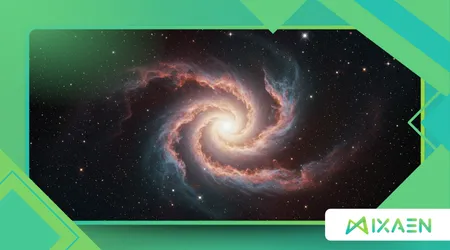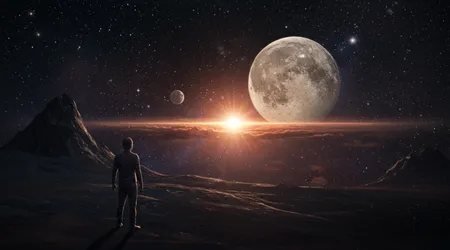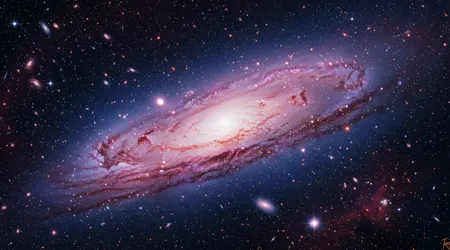The Nature of Infinity: Can the Universe Be Infinite?

The nature of infinity captivates scientists, philosophers, and dreamers, sparking debates about the universe’s true scope.
Anúncios
Is it boundless, stretching beyond comprehension, or confined within limits we cannot yet grasp? This question probes the essence of existence, blending cosmic wonder with rigorous inquiry.
Infinity challenges our understanding of space, time, and reality itself. Exploring the nature of infinity invites us to confront profound mysteries about our universe’s structure and our place within it.
This article delves into the science, philosophy, and implications of an infinite universe, offering fresh perspectives and real-world insights.
From ancient thinkers to modern cosmologists, the concept of infinity has fueled curiosity and controversy.
Does the universe extend forever, or does it curve back on itself? Recent discoveries in cosmology, coupled with philosophical reflections, provide clues but no definitive answers.
This exploration will unravel the nature of infinity through scientific evidence, theoretical models, and human imagination, aiming to illuminate one of the universe’s greatest enigmas.
Let’s embark on this journey to understand whether infinity is a cosmic reality or a conceptual illusion.
The Scientific Lens: What Cosmology Says About Infinity
Cosmology offers tools to probe the nature of infinity through observation and theory. The universe’s observable portion spans 93 billion light-years, yet this is merely a fraction of its potential entirety.
Scientists study cosmic microwave background radiation to infer the universe’s shape. Data from the Planck satellite, published in 2018, suggests a flat universe, implying it could extend infinitely.
However, “flat” doesn’t guarantee infinity; it may curve subtly beyond our detection.
++ The Arrow of Time: Why Does Time Move Forward?
The universe’s expansion, discovered by Edwin Hubble, complicates the picture. If it expands forever, infinity becomes plausible. Yet, expansion rates vary, and dark energy’s role remains unclear.
Could the universe loop back, like a cosmic Möbius strip? Current models lean toward infinite or near-infinite flatness, but limitations in measurement leave room for doubt.
Finite resources, like stars and galaxies, challenge the idea of an infinite universe. If infinite, why isn’t the night sky uniformly bright?
This paradox, known as Olbers’ paradox, suggests a finite age or structure. Cosmologists continue to refine models, seeking answers in the universe’s geometry and fate.

Philosophical Reflections on the Nature of Infinity
Philosophy grapples with the nature of infinity beyond empirical data. Ancient Greeks like Zeno pondered infinity’s paradoxes, questioning divisibility and motion.
If space is infinite, can we truly comprehend its vastness? Philosophers argue infinity may be a mental construct, not a physical reality.
Immanuel Kant suggested space exists only as a human perception. Does infinity, then, reflect our mind’s attempt to grasp the ungraspable?
Modern thinkers propose infinity as a boundary condition, not a tangible state. This perspective shifts the nature of infinity from cosmic to conceptual.
Consider a library with infinite books. Would it contain all knowledge or become meaningless chaos? This analogy mirrors debates about an infinite universe’s coherence.
Also read: The Holographic Principle: Is Our Reality a Projection?
Philosophers caution against equating mathematical infinity with physical reality, urging nuanced exploration of the concept.
Infinity also raises existential questions. If the universe is infinite, does human significance diminish?
Philosophers like Nietzsche wrestled with such implications, suggesting infinity could amplify our search for meaning. These reflections deepen our inquiry into the nature of infinity.
Mathematical Infinity vs. Physical Reality
Mathematics embraces infinity as a precise concept, but does it translate to the cosmos? In calculus, infinity describes unbounded limits, elegantly handling vast quantities.
Yet, physical infinity demands evidence. Can the nature of infinity exist beyond equations?
Consider a number line stretching endlessly. Mathematically, it’s coherent; physically, it’s untestable. Quantum mechanics suggests a granular universe, with Planck-scale limits.
If space is quantized, infinity may be impossible. Current research, like loop quantum gravity, explores this idea.
In 2023, a study in Physical Review Letters proposed space-time discreteness, challenging infinite divisibility.
This hints at a finite universe, but conclusive evidence remains elusive. Mathematics offers tools, yet the cosmos resists simple answers.
Read more:Can the Universe Think? Exploring Panpsychism
Imagine slicing a cake infinitely. Each slice becomes infinitesimally small, yet never vanishes.
This thought experiment reveals infinity’s abstract allure but questions its physicality. Bridging math and reality remains a cosmic puzzle.
The Universe’s Fate: Implications of Infinity
What does the nature of infinity mean for the universe’s future? An infinite universe could expand forever, driven by dark energy.
Alternatively, it might collapse or stabilize. Each scenario reshapes our understanding of cosmic destiny.
The “heat death” model predicts a universe thinning out infinitely, cold and sparse. Yet, an infinite universe could host pockets of eternal renewal.
Recent simulations suggest cyclic models, where finite regions rebirth endlessly. Infinity complicates these predictions.
If infinite, could parallel universes exist within it? Multiverse theories propose infinite realms with varied physics. This idea, while speculative, fuels debates about the nature of infinity in cosmology.
| Model | Description | Implication for Infinity |
|---|---|---|
| Flat Universe | Expands indefinitely, potentially infinite | Supports infinite extent |
| Closed Universe | Curves back, finite volume | Rejects physical infinity |
| Cyclic Universe | Repeats in finite cycles | Limits infinite expansion |
| Multiverse | Infinite parallel universes | Embraces cosmic infinity |
This table illustrates competing models, each with unique implications for infinity’s role.
Infinity in Human Experience: Cultural and Practical Perspectives
Beyond science and philosophy, the nature of infinity shapes human culture.
Ancient myths depicted boundless skies, reflecting awe at the cosmos. Today, infinity inspires art, literature, and technology, symbolizing limitless possibility.
Consider a fractal pattern, like a snowflake, repeating infinitely at smaller scales. This mirrors how humans perceive infinity in nature’s complexity. Artists use fractals to evoke the boundless, connecting the nature of infinity to creativity.
In technology, infinity informs algorithms handling vast datasets. Google’s search engine, for instance, processes “infinite” queries daily.
A 2024 report estimated Google handles 8.5 billion searches daily, showcasing infinity’s practical relevance. This statistic grounds the concept in real-world impact.
Why do we chase infinity in our stories and innovations? This rhetorical question highlights humanity’s drive to transcend limits, mirroring the universe’s potential boundlessness. Infinity, thus, becomes a lens for human ambition and curiosity.
Challenges in Observing an Infinite Universe

Detecting the nature of infinity poses immense challenges. Our observable universe is finite, limited by light’s speed and cosmic expansion.
Telescopes like the James Webb Space Telescope reveal distant galaxies, but not infinity itself.
Cosmic background radiation offers clues, yet its uniformity doesn’t confirm infinity. If the universe loops, we might see repeated patterns, but none are detected. Current instruments lack the precision to settle the debate.
Imagine searching for the ocean’s edge from a single beach. This analogy underscores our observational limits. Future technologies, like gravitational wave detectors, may offer new insights into the universe’s scope.
The cosmic horizon restricts our view, making infinity a hypothesis, not a fact. Advances in quantum cosmology might one day clarify whether infinity is observable or purely theoretical.
Conclusion: Embracing the Mystery of Infinity
The nature of infinity remains one of cosmology’s greatest mysteries, blending science, philosophy, and human imagination.
Whether the universe stretches endlessly or curves subtly, infinity challenges our understanding and inspires wonder.
From Planck’s data to philosophical musings, we’ve explored how infinity shapes our cosmic narrative. It’s not just a scientific question but a profound reflection on existence.
As we peer into the cosmos, infinity invites humility and curiosity. Will we ever grasp its true nature?
The journey to understand the nature of infinity continues, urging us to explore, question, and dream. Let’s keep seeking answers, knowing each discovery brings us closer to the universe’s heart.
Frequently Asked Questions
Q: Can we prove the universe is infinite?
A: No definitive proof exists. Current data, like Planck’s 2018 findings, suggests a flat, potentially infinite universe, but observational limits prevent certainty.
Q: How does infinity affect daily life?
A: Infinity shapes technology, like algorithms processing vast data, and inspires art and philosophy, reflecting humanity’s drive to explore limitless possibilities.
